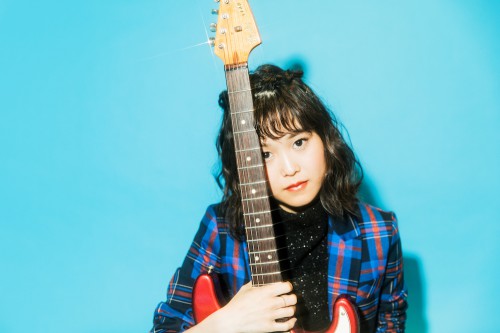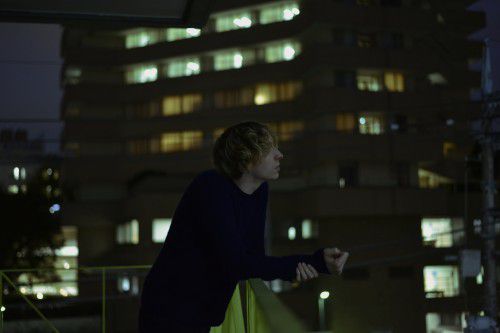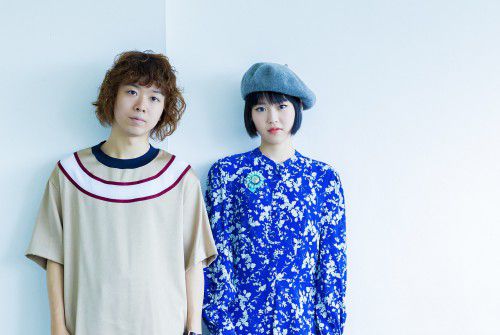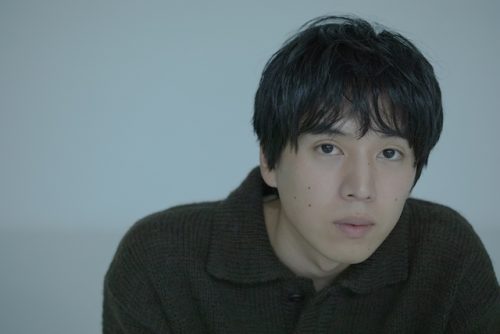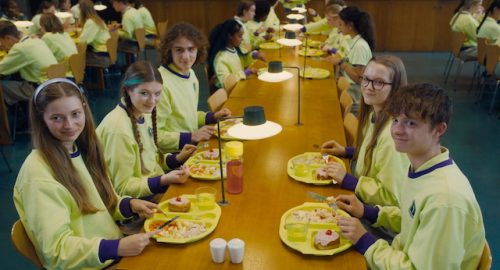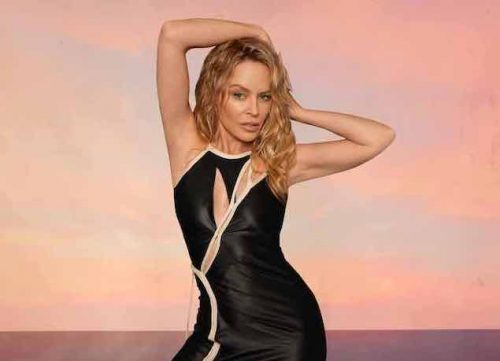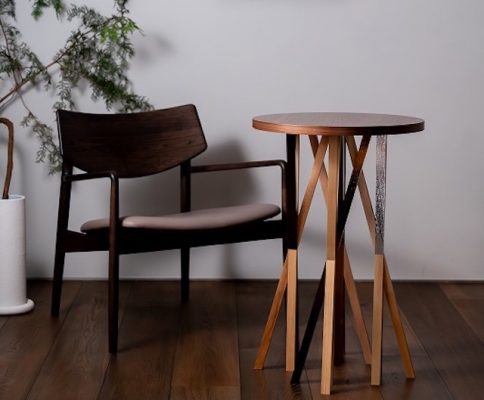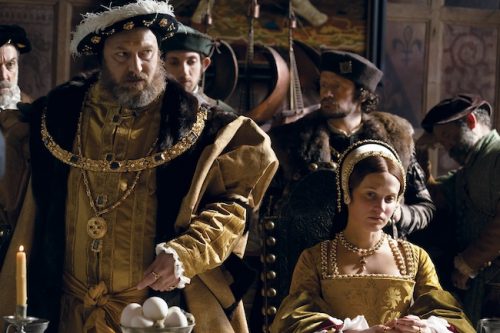
-Thank you for the opportunity! I’m a musician too and I play the guitar and sing and I’ve been really influenced and inspired by your works so it’s really an honor to be interviewing you. I saw your performance two years ago at the “HOSTESS CLUB WEEKENDER”. I bet you’ve been to Japan several times before, and many fans are looking forward to your performance this week at Summer Sonic for sure. When I saw your performance last time you came, I was really interested in how you developed your shows.Please tell me what kind of process you go through creating a live performance, and whether or not you have a rule or routine you follow.
Annie: For the show team, yeah. Last record, I was really inspired by post-modern choreographies so I worked with Annie-B Parson and just a bunch of gesturing and stuff. Usually the genesis of it starts from the album artwork, and the concept behind an album so that was near future / cold leader kind of vibe, so dominant central tuition institution kind of vibe. So it’s going to be very, colorless and very absorbed because I feel like the times we live in are very absorbed. Yeah, it’s a long process to put it all together.
-Many of your music album covers are portraits of you, and I actually am really influenced by them.Three of my albums are portraits too.
Annie: You have three albums out?
-Yes, three mini-albums. Seven songs in each of them. You were saying the artwork and the music is the center of what branches out to all of the other aspects of your creations and performances. Personally, I feel like there’s a distinct style to you and your details of your shows.Do you plan it out logically or is it more from intuition?
Annie: It’s a bit of both. A lot of times, it’s just kind of ideas that come to you like when your walking down the street or in the middle of the night and think, “Oh, that would be very exciting!” Then it goes into the process of going, “How do I do that?” Then, there’s another step to the process, which is “How is that going to feel?” and “How is that going to translate?” So that’s the kind of where you refine it until it’s something worthy of people paying money to see.
-So the little steps and the dances that you do with your guitar are influenced by the modern choreographies?
Annie: Those things just naturally come. I just kind of do it. It’s my signature move.
-Talking about the Japanese audience, do you find a difference? Is there a difference between countries?
Annie: I think so. I think for the Japanese fans, there seems to be a tremendous pride in knowing something, and knowing about everything going on. So the Japanese fanbase is just really knowledgeable and excited, and not just a casual event. It seems like it.
-I do relate to that. A lot of Japanese people think the Japanese audience is like a conservative shy kind of crowd, but I think they want to know things in depth and want to love it deeply before being crazy about it,expressing their love towards it.
Annie: Yeah, that makes a lot of sense. That’s cool.
-There seems to be calculation and a lot of the moves planned out and scripted in your shows. Does the audience‘s reaction to your performance affect the way you perform at that moment?
Annie: It does. It’s more settle because it’s very organised, but you can always feel the crowd and something special happens between the audience and the performer. But It may not look dramatically different from night to night, but in my experience it is different from night to night.
-As I said earlier, I always love your artwork , it’s really simple and refined, and it always has a matching feel with the music itself. Do you feel a strong connection between visual elements and the music? Is it something you develop in a parallel process, or are the two separate?
Annie: It’s been different for different albums. In the last album, the aesthetic was more drawn from the feel of the record, and we went wild with it. This one, the aesthetic was more cultivated during the recoding and finishing of the record. So that’s a little bit more cohesive. As far as inspiration goes, we grab that from images that have kind of been there internally.
-By the way, we saw the video you made for us, it was hilarious and awesome! It made it harder for me to interview you though.
Annie: Oh no, it was supposed to be funny though. It was Toko-san doing the voice acting.
-Her voice was so sweet. She has a really nice voice. So, maybe it was a joke but you were talking about the album title in the video, saying that “Masseduction” was actually short for ass-education. I was listening to the song, and there were several words that sound familiar to “Masseduction”, and the play on words gave it an interesting touch, making it imaginative. The album was vivid and dynamic, and the mix , the arrangement and the instrumentation was very refreshing to me. It seemed intimate and full of love as well, as if you were right next to me telling a story. Can you please tell me a little bit more about the process of making the album?
Annie: Well, a lot of the vocals that are on the album are really dry, and there’s no reverb or anything on them. I think that gives it that more conversational quality, sometimes we’d think that women’s voices are too processed. People experience them as less personal. I made the record with Jack Antonoff, and he’s just a wonderful man, so supportive, so enthusiastic, the opposite of cynical, whatever that is – unjaded. I knew that I wanted to write about power, and I knew I wanted it to have programmed drums with pedal steel. Those were the three things that I knew from the very beginning, and the rest of it was just trying to write the best songs that were the most emotional, instead of just interesting.
-If I’m allowed, I want to ask you some questions as a musician. You have been playing guitar since twelve,am I right? What does the guitar represent for you?
Annie: It’s funny. My relationship to the guitar is really shifted and changed. At one point, I feel like it was so central to my identity. It still is, but it’s a funny instrument because you don’t really write on guitar very often.
-You mean you don’t make songs with your guitar?
Annie: Not really. It’s weird. I mean it could be a weapon or it could be a shield, and it’s all those things to me, but it’s funny because I don’t pick it up and play it as much as I you might think. A lot of times, I write on totally different instruments.
-I relate to that too because a lot of the times, people see my guitar before my vocals. I was really influenced by groovy rock music from the sixties, and originally, I started off with classical guitar when I was four, but for me I am a singer and there’s a message that I want to tell the audience. As you were saying, maybe it’s a weapon or a tool just to portray an image for the listener. The phrases you play on the guitar seem out of the ordinary. Where do you pick up your phrases from? How did you practice and develop it?
Annie: I think that the guitar lines that I feel like are my most successful guitar lines are things that were melodies that just occurred to me here first. Because as a guitar player, there’s so much about muscle memory. A lot of the times, my muscles just want to go back to like blues and that stuff. I think I also play in a lot of different tunings, so that’s another way to get out of playing the same things. Like you can play the same shapes, but you can get new sounds with the same shapes with different tunings.
-I always find songwriting as a unique experience, and I want it to be that way because I making it a routine will most probably make it sound like another song I have written before. So there might not be like a magical answer to this question, but is there a tip to get out of a songwriting slump?
Annie: Yeah, there are. there’s one thing which is, if you’re really stuck, go out and do something different for a few minutes and come back to it because usually the right answer will kind go just occur to you when you’re off doing another task with your body. If I was working on something on guitar and I was feeling quite right, I would go make a lead or a program, or dig into all the melodies. Whatever melody that occurs to you, just record it so you have a box of thoughts so you can just go sort through those and kind of put them in a random order. There are a lot of things you can do. I took a bunch of midlives, and I just moved the notes around so they were all in one key. Then I ran through I synth so it sounded cool. There’s just so many ways to be generative. It doesn’t always have to come from you. I think the important part it just to keep writing, keep finding ways like picking up an instrument that you don’t play very well, like write on bass. You don’t have to think about how the chord quality is.
-I think that a lot of your fans, not only relate to the aesthetics of your creation and the music itself, but find that playful child-like attitude, “enjoying the process “ kind of feel from your art attractive. So, going back to the topic of your latest album , you were saying “power” was one of the keys words when making this album. Was this theme predominant for you from quite a long time ago or did it occur to you recently?
Annie: I think it had definitely been on my mind for awhile, and watching the world in many ways shift to power, especially in the states. I think for me, it sounds like my seduction that I’m seducing or I’m seduced to. It’s really about the big big big forces that can swallow you full, whether it’d be charismatic, political leader, a lover, or drugs.
-I feel that having independent mind is really important, but at the same time it’s not like every opinion of the majority is wrong. You can actually agree to what everybody is saying as well. Is there something like a “moral code” you follow when choosing things in life?
Annie: Yeah I think, “Do no harm” is a good one. I feel lucky that I do think that music and art at their best don’t exploit anybody and that’s something that helps me sleep a better at night because there’s so much about it to the interesting and capitalist culture. Things that want your attention at the time.
-Like trying to persuade someone to think a certain way?
Annie: Yeah, you can’t be like that. Music is something that reminds people of their empathy. It reminds people of their identity.
-Maybe that’s why, in this day and age, music is still free?
Annie: I think music’s the best. My career a lot of times people get more jaded, but I feel the complete opposite. It’s just a fun and exciting thing to me.
-St. Vincent to me is like, a musical goddess and a mysterious creature, but I was wandering what you do outside of playing and making music.
Annie: Directing short stories and things is really fun to do, so I can direct a feature film. So that’ll be a big project in the next couple of years. Making films that so much planning and all that. So I do that. People sometimes ask me on the internet “What’s your hobby?” and I don’t really know.
-You sure are a creator at heart! I like drawing and making things in my my time alone too.
Annie: But that’s kind of the same, like being generative.
-So last question, I heard from the last interview you wrote a song inspired from a dream you saw while sleeping, if that information is right.
Annie: Um, they’re definitely melodies on the record that I woke up singing, so that’s where you got it maybe.
-Could you tell me what you want to dream when you go to sleep tonight?
Annie: Oh, that’s a good question. A dream that Donald Trump is not the president of the United States.






